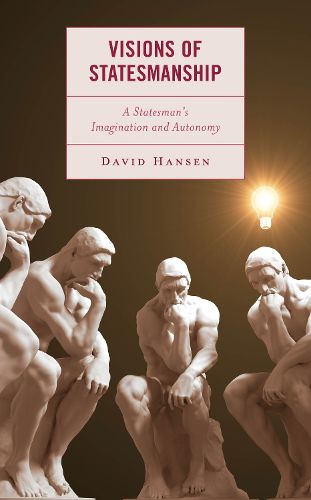Readings Newsletter
Become a Readings Member to make your shopping experience even easier.
Sign in or sign up for free!
You’re not far away from qualifying for FREE standard shipping within Australia
You’ve qualified for FREE standard shipping within Australia
The cart is loading…






In Visions of Statesmanship: A Statesman's Imagination and Autonomy, David Hansen provides a critical examination of the figure of the statesman as it has been presented in the philosophical reflections of three key thinkers: Plato, Yannis Markrygiannis, and Cornelius Castoriadis. In the course of the analysis, the chapters broadly investigate and assess the complex reception history that obtains among this particular configuration of intellectual history by offering authors, activists and texts linked to critical, political, and social theory in German, French, and Anglo-American contexts. The focus falls on the imagination (variously conceived) and notions of autonomy, and how these ideals potentially confront specific conditions of political and social reality. What emerges across the millennia, is an episodic account of dialectical encounters between freedom and unfreedom, how philosophical endeavors discern alternatives that raise consciousness of societal possibilities that challenge realities with the aim of changing practices of domination, oppression, and exploitation. Rather than regard intellectual and literary labor as ideological reflections of the material base, Hansen considers to what extent these free works of the imagination offer concrete visions that would increase justice, communal harmony, and global peace historical contingencies and limitations.
$9.00 standard shipping within Australia
FREE standard shipping within Australia for orders over $100.00
Express & International shipping calculated at checkout
In Visions of Statesmanship: A Statesman's Imagination and Autonomy, David Hansen provides a critical examination of the figure of the statesman as it has been presented in the philosophical reflections of three key thinkers: Plato, Yannis Markrygiannis, and Cornelius Castoriadis. In the course of the analysis, the chapters broadly investigate and assess the complex reception history that obtains among this particular configuration of intellectual history by offering authors, activists and texts linked to critical, political, and social theory in German, French, and Anglo-American contexts. The focus falls on the imagination (variously conceived) and notions of autonomy, and how these ideals potentially confront specific conditions of political and social reality. What emerges across the millennia, is an episodic account of dialectical encounters between freedom and unfreedom, how philosophical endeavors discern alternatives that raise consciousness of societal possibilities that challenge realities with the aim of changing practices of domination, oppression, and exploitation. Rather than regard intellectual and literary labor as ideological reflections of the material base, Hansen considers to what extent these free works of the imagination offer concrete visions that would increase justice, communal harmony, and global peace historical contingencies and limitations.